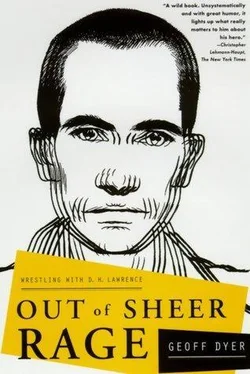The perfect life, the perfect lie, I realised after Christmas, is one which prevents you from doing that which you would ideally have done (painted, say, or written unpublishable poetry) but which, in fact, you have no wish to do. People need to feel that they have been thwarted by circumstances from pursuing the life which, had they led it, they would not have wanted; whereas the life they really want is precisely a compound of all those thwarting circumstances. It is a very elaborate, extremely simple procedure, arranging this web of self-deceit: contriving to convince yourself that you were prevented from doing what you wanted. Most people don’t want what they want: people want to be prevented, restricted. The hamster not only loves his cage, he’d be lost without it. That’s why children are so convenient: you have children because you’re struggling to get by as an artist — which is actually what being an artist means — or failing to get on with your career. Then you can persuade yourself that your children prevented you from having this career that had never looked like working out. So it goes on: things are always forsaken in the name of an obligation to someone else, never as a failing, a falling short of yourself. Before you know it desire has atrophied to the degree that it can only make itself apparent by passing itself off as an obligation. After a couple of years of parenthood people become incapable of saying what they want to do in terms of what they want to do. Their preferences can only be articulated in terms of a hierarchy of obligations — even though it is by fulfilling these obligations (visiting in-laws, being forced to stay in and baby-sit) that they scale the summit of their desires. The self-evasion does not stop there: at some level they are ashamed because they realise that these desires are so paltry as barely even to merit the name of desires and so these feeble desires have to take on the guise of an obligation.
I ranted on to Laura about this night after night. I was feeling all these things particularly acutely because, at that time, I was failing to make any progress with my study of Lawrence and this failure played a crucial part in my succumbing to a deep depression which I will discuss in detail later. The long and the short of it was that I became convinced that I needed a job, a day job, something with minimal responsibilities which would impose some discipline, some routine on me, something which would stop me indulging myself all day long seven days a week. If I had a job, I thought, I might even make more progress with my study of Lawrence because then I would value my free time. I could work in a shop, say, and all the time I was there I would be looking forward to knocking off, to going home and getting down to work on my study of Lawrence. As it was, as things stood in Rome, as they had stood in Alonissos, as they had stood for many years irrespective of where I was living, I had nothing to keep me from writing my study of Lawrence, and so I never buckled down to it. If I had a three-day-a-week job, I reasoned, I would get more done in the remaining four than I did at the moment with seven at my disposal. Such an arrangement would distance me from Lawrence who, once he had given up teaching, never considered getting a part-time job in a shop or anywhere else, but I was losing faith in what might be termed ‘method’ criticism and, if truth be told, I was losing interest in Lawrence. More precisely I had lost interest in my study of Lawrence. This all came to a head after our ill-fated trip to Oaxaca, which I will return to later, but the upshot of all this was that I believed that I had to get a job and since I couldn’t possibly get a job in Italy — I had, needless to say, made no attempt to learn Italian — my thoughts which were already turning towards telly in England now became focused on a job in England. I began to think I would love a life in England, working at a nice part-time job and then watching telly in the evenings and, if the urge took me, doing some work on my study of Lawrence which, instead of being this daunting undertaking, would assume the status of a hobby, something I could get on with in odd moments, when there was nothing on telly.
So here I am, here we are — Laura’s sister is sub-letting the apartment in Rome — in Oxford. Laura likes it. I hate it, needless to say, am sick of watching telly and have already abandoned any thought of getting part-time employment. As soon as I got back to England, back to this grim little rock, I felt myself shrinking. Back in the land where I belonged, back among my own tribe, I immediately missed not belonging, missed that strange home you can build out of homelessness, out of not belonging. And at the same time, coexisting easily with the feeling it apparently contradicted, was the feeling that I did not belong here, that there was no place for me here, that I was more at home in Rome where I had never felt at home for a moment.
And overlaying all of this was the sense that this hatred of England was not entirely authentic, that I felt this way because it was a Lawrentian sentiment, that what I was actually experiencing was plagiarised emotion. I was not the first person to suffer from this condition. From France, in 1961, John Osborne dispatched his infamous ‘Letter to my Countrymen’: ‘This is a letter of hate. It is for you my countrymen. I mean those men of my country who have defiled it. . Damn you, England. You’re rotting now, and quite soon you’ll disappear. My hate will outrun you yet, if only for a few seconds. I wish it could be eternal.’
Signed ‘In sincere and utter hatred’, it was dashed off, apparently, in response to the escalating crisis of the Cold War, but what Osborne was really excited about was the chance to sound like Lawrence. A year earlier he had accused the English of ‘living in a world without wonder’; a year later his loathing for Hugh Gaitskell was validated by appeal to a Lawrentian ideal: ‘the root of living’. But in the summer of 1961, in Valbonne, he was virtually quoting Lawrence. It was not just that Lawrence offered a template for anti-English indignation, he provided the letter of the text: ‘Curse you, my countrymen, you have put the halters round your necks, and pull tighter, from day to day,’ he had written. ‘You are strangling yourselves, you blasted fools. Oh my countrymen. .’ That was in 1912; by 1917, after the authorities refused to endorse his passport, thereby sabotaging his plans to leave for America, Lawrence was even more vehement: ‘I curse my country with my soul and body, it is a country accursed physically and spiritually. Let it be accursed forever, accursed and blasted. Let the seas swallow it, let the waters cover it, so that it is no more. And let it be known as accursed England, the country of the damned. I curse it, I curse England, I curse the English, man, woman, and child, in their nationality let them be accursed and hated and never forgiven.’
I enjoyed these sentiments, enjoyed them even more when I was expressing them myself. It was a sign of Englishness, this lambasting of England and Englishness. ‘If thine eye offend thee pluck it out — but I am English and my Englishness is my very vision,’ Lawrence declared, recognising this tendency in himself. ‘This is my own, my native land,’ I said to myself: land of rules where if anything is fun it is illegal; where, if you are sitting on a bus, it is all but impossible to conceal your loathing of the people around you but you do conceal it, somehow, because all around your fellow-passengers are somehow concealing their loathing of you. Ah yes, hating England from abroad was one thing but it didn’t compare with the real thing, with hating it while you were there.
As for Oxford, or Dullford to give it its proper name, a cloud of stupidity, of extreme mental fatigue, hangs over the place because of all these dim-wit academics shovelling away at their research, digging the graves of literature. Contrary to popular belief Oxford has the highest concentration of dull-witted, stupid, narrow-minded people anywhere in the British Isles. Fact. Oh, I hate it — and for that reason it’s absolutely perfect. Now that I’m here in Dullford, in England, all I want is to be back in Rome but rather than being a source of torment this brings peace of mind. Now that I have a place in England I have no desire to be here, I’m free to wander the world as before — except that before, when I didn’t really live anywhere, I was overwhelmed by anxiety about where I was going to live, was desperate to be back in England.
Читать дальше












